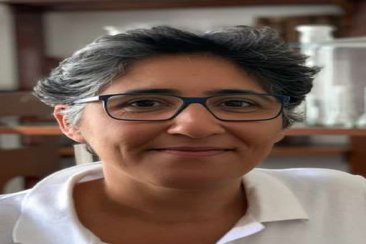
Hind Medyouf
Georg-Speyer-Haus
Host: Juliane Winkler
Program
Harnessing the Tumor microenvironment to Enable Cancer Control
How do tumor cells exploit the microenvironment to promote cancer progression? Over the last decades, our understanding of cancer has undeniably evolved from a tumor cell centric view towards a more comprehensive “tissue-like” picture integrating extrinsic cues from the surrounding tumor microenvironment (TME) to shape a local ecosystem that favors the acquisition of the so called “hallmarks of cancer”. This has fueled the idea that deciphering the TME signals cancer cells rely on, could help unravel tumor vulnerabilities and pave the way to new treatment opportunities. However, such niche-dependencies do not follow a “one size fits all” pattern but are rather “made to tailor” as they can be highly dependent on the cancer type, disease stage, organ site as well as dynamically evolving niche functions (e.g., because of physiological aging). The Medyouf lab is mapping and leveraging organ specific TME contributions that specifically hinder the early steps of the “cancer immunity cycle” thereby promoting immune evasion and limiting the therapeutic benefit of adaptive immune checkpoint therapies, both in hematological malignancies and metastasis, in particular to the brain. The group is also actively exploring the impact of age-related niche changes on cancer evolution, to uncover new means for early disease interception and the rational design of new therapeutic combinations.
About the speaker:
Dr. Hind Medyouf received her MSc in Genetics from the University Denis-Diderot in Paris (France). She gained her PhD at the same university dissecting the role of deregulated signaling in the pathogenesis of T-cell Acute Lymphoblastic Leukemia at the Curie Institute (2003-2007, France with Dr. Jacques Ghysdael). Her PhD was followed by two postdocs as an HFSP fellow in Canada (2008-2010, Terry Fox Lab with Dr. Andrew Weng) and EMBO fellow in Germany (2010-2014, DKFZ with Prof. Andreas Trumpp). As a trainee, she built a strong expertise and track record in the biology of normal hematopoietic stem cells, the pathophysiological mechanisms driving hematological malignancies and their exploitation for therapeutic purposes.
Hind uncovered the oncogenic function of a druggable serine threonine phosphatase, Calcineurin, in T-ALL (Medyouf, Nat Med, 2007) and contributed a landmark study that unraveled the stromal niche dependency of genetically altered hematopoietic stem cells that drive human Myelodysplastic Syndromes (Medyouf, Cell Stem Cell, 2014). In 2015, Hind received a Jose Carreras Career Award and an ERC starting grant to establish her independent research group and is currently an EMBO Young Investigator at the Institute for Tumor Biology and Experimental Therapy, Georg-Speyer-Haus, in Frankfurt, Germany. Her current research is mainly centered around the importance of the tumor microenvironment in hematological malignancies and metastasis. Her lab explores the broad area of tumor-niche co-evolution with a specific emphasis on (2) how this ecosystem promotes immune evasion and (2) how age-related changes impact cancer progression and modulate therapeutic sensitivities.
